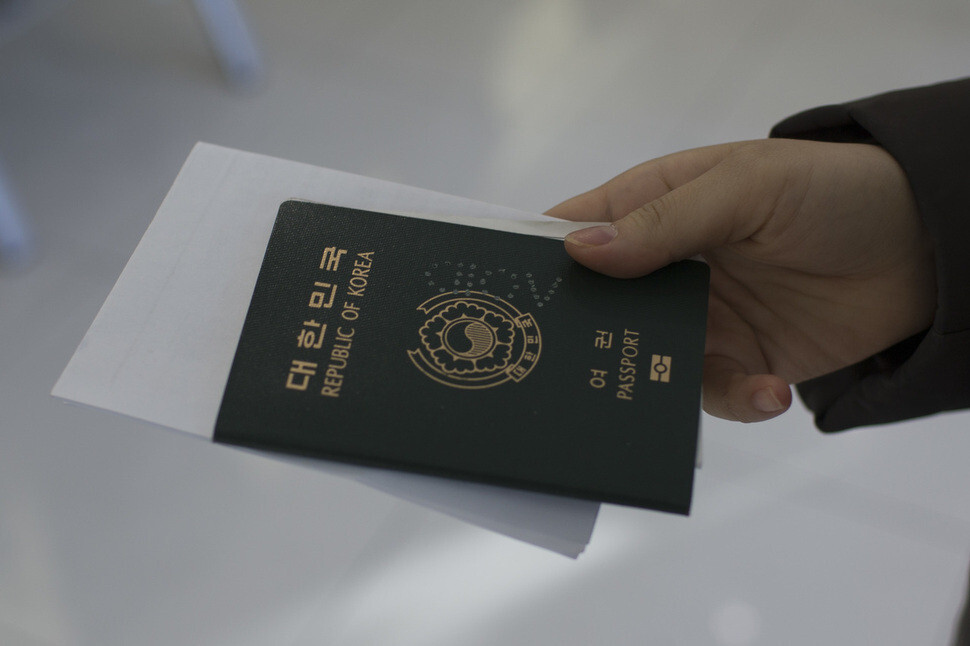hankyoreh
Links to other country sites 다른 나라 사이트 링크
Seoul court rules singing of national anthem as justifiable criterion in naturalization process

The inclusion of “singing the national anthem” as a review criterion for foreign nationals seeking naturalization in South Korea is justifiable, a court has ruled.
The 13th administrative division of Seoul Administrative Court under Judge Jang Nak-won announced on Mar. 29 that it had ruled against the plaintiff in a suit brought against the Ministry of Justice (MOJ) by a foreign national identified by the initial “S,” who was asking to overturn the rejection of their nationality request.
S, who is from South Africa, submitted a request for general nationalization approval with MOJ in December 2017. But S was disqualified in their first and second interviews, on the basis of which MOJ decided to deny naturalization. In response, S filed an administrative suit accusing MOJ of overstepping and abusing its discretionary authority.
But the court also concluded that S’s naturalization should not be approved, having determined that they did not meet the conditions of “basic knowledge as a national of the Republic of Korea, such as Korean language skills and understanding of Korean customs” as a requirement for general naturalization according to Article 5 of the Nationality Act.
As a basis for this, the court noted that in the two interviews in which S participated, both interviewers had given an assessment of “unsuitable” on categories such as “attitude as a South Korean national,” “beliefs regarding the basic liberal democratic order,” “basic knowledge as a citizen,” and “ability to sing the national anthem.” The court concluded that the individual review categories were “objective and rational” as standards for determining the conditions for general nationalization according to the Nationalization Act.
“The interviewers’ decisions regarding suitability or unsuitability were consistent across the first and second interviewers, and the content of their comprehensive written opinions was also largely consistent,” the court said.
“No evidence can be found to conclude that the interviewers lacked objectivity or fairness or otherwise overstepped or abused their discretionary authority,” it added.
By Jang Ye-ji, staff reporter
Please direct comments or questions to [english@hani.co.kr]

Editorial・opinion
![[Column] Park Geun-hye déjà vu in Yoon Suk-yeol [Column] Park Geun-hye déjà vu in Yoon Suk-yeol](https://flexible.img.hani.co.kr/flexible/normal/500/300/imgdb/original/2024/0424/651713945113788.jpg) [Column] Park Geun-hye déjà vu in Yoon Suk-yeol
[Column] Park Geun-hye déjà vu in Yoon Suk-yeol![[Editorial] New weight of N. Korea’s nuclear threats makes dialogue all the more urgent [Editorial] New weight of N. Korea’s nuclear threats makes dialogue all the more urgent](https://flexible.img.hani.co.kr/flexible/normal/500/300/imgdb/original/2024/0424/7317139454662664.jpg) [Editorial] New weight of N. Korea’s nuclear threats makes dialogue all the more urgent
[Editorial] New weight of N. Korea’s nuclear threats makes dialogue all the more urgent- [Guest essay] The real reason Korea’s new right wants to dub Rhee a founding father
- [Column] ‘Choson’: Is it time we start referring to N. Korea in its own terms?
- [Editorial] Japan’s rewriting of history with Korea has gone too far
- [Column] The president’s questionable capacity for dialogue
- [Column] Are chaebol firms just pizza pies for families to divvy up as they please?
- [Column] Has Korea, too, crossed the Rubicon on China?
- [Correspondent’s column] In Japan’s alliance with US, echoes of its past alliances with UK
- [Editorial] Does Yoon think the Korean public is wrong?
Most viewed articles
- 1‘We must say no’: Seoul defense chief on Korean, USFK involvement in hypothetical Taiwan crisis
- 2N. Korean delegation’s trip to Iran shows how Pyongyang is leveraging ties with Moscow
- 3[Column] Park Geun-hye déjà vu in Yoon Suk-yeol
- 4Amnesty notes ‘erosion’ of freedom of expression in Korea in annual human rights report
- 5‘Weddingflation’ breaks the bank for Korean couples-to-be
- 646% of cases of violence against women in Korea perpetrated by intimate partner, study finds
- 7[Reportage] On US campuses, student risk arrest as they call for divestment from Israel
- 8“Parental care contracts” increasingly common in South Korea
- 9[Interview] Dear Korean men, It’s OK to admit you’re not always strong
- 10Korean government’s compromise plan for medical reform swiftly rejected by doctors